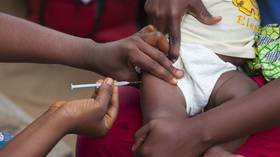Hundreds dead as African nation grapples with disease outbreak

Nigeria is battling a diphtheria outbreak that has killed more than 600 people, most of them children, officials have said. Many of the infected minors were not vaccinated.
According to multiple reports on Thursday, there are now 14,000 suspected cases of the disease, double what the Nigeria Center for Disease Control and Prevention recorded last month.
The outbreak, which started last December, has affected 19 of the country’s 36 states as well as the federal capital, Abuja. The epicenter is Kano state in northern Nigeria, where more than 500 deaths have been recorded.
Diphtheria is highly contagious and affects the nose and throat. Symptoms typically emerge gradually, beginning with a sore throat and fever.
In severe cases, the bacteria produce a toxin that causes a thick gray or white patch at the back of the throat that can block the airways.
Dr Faisal Shuaib, head of the National Primary Health Care Development Agency, who visited a diphtheria isolation center in Kano city on Wednesday, said that it was disturbing that young children were suffering from an “entirely preventable disease.”
Shuaib added that measures including contact tracing have contributed to a decline in the number of cases.
The World Health Organization (WHO) has said inadequate testing and some patients not reporting their symptoms meant it was difficult to accurately track infection rates.
The organization has stressed that immunization is the most effective way of managing the crisis, and has urged parents with unvaccinated or partially vaccinated children to visit their nearest health clinics.
According to the WHO, only 57% of Nigerians have received the pentavalent vaccine, which protects against five life-threatening diseases, including diphtheria. It added that “vaccine coverage of 80–85% must be maintained to ensure community protection.”
The last significant diphtheria outbreak in Nigeria occurred in 2011, when 21 people lost their lives and 98 were infected in Borno state, the WHO reported.














